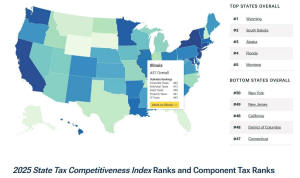|
The Tax Foundation has released its annual State Tax
Competitiveness Index, which compares each state on more than
150 variables in five areas of taxation: corporate taxes,
individual income taxes, sales and excise taxes, property and
wealth taxes, and unemployment insurance taxes.
The authors said states landing near the bottom of the rankings
tend to have several issues in common: complex, nonneutral taxes
with comparatively high rates. They typically have high and
progressive income tax rates; impose harmful gross receipts,
capital stock, and bequest taxes; penalize capital investment
through poorly designed corporate taxes; and have ill-structured
sales tax bases that include a disproportionate share of
business inputs.
Illinois ranked 37th overall and near the bottom in the
corporate, unemployment insurance and property tax categories.
Senior Policy Analyst Andrey Yushkov said Illinois ranks 13th in
individual taxes, but if the so-called “millionaires tax,” which
was approved by voters in a non binding question on Election
Day, is put into place, the state will slip in the rankings.
“If this additional 3% surtax on millionaires is ultimately
implemented and the constitution of the state is changed, then
we’ll detrimentally affect the tax competitiveness in this
particular category,” said Yushkov.
According to the study, the top three tax-friendly states are
Wyoming, South Dakota and Alaska. New York came in last place,
followed by New Jersey and California.
“The index rewards states for structurally sound, pro-growth tax
policies, making it a useful tool for policymakers who want
their states’ tax systems to be welcoming to business and human
capital,” said Yushkov. |
|




